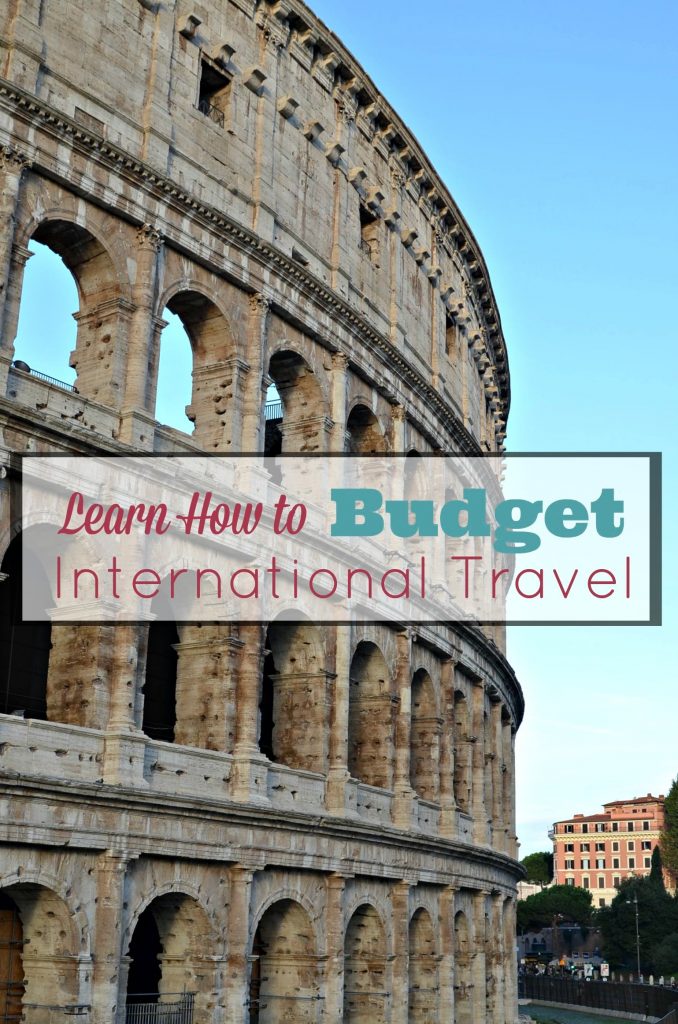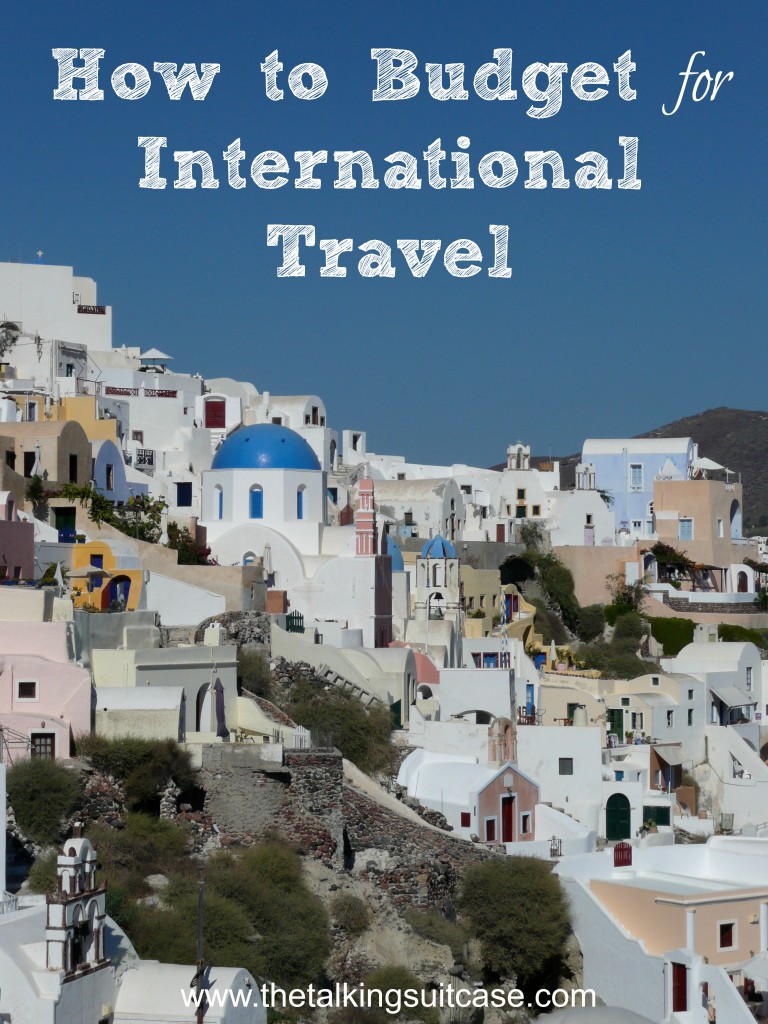
When you know how to budget international travel, you’ll save so much money that you could plan a second vacation! There are a lot of things that are different overseas than in the United States. Being prepared for them means you don’t waste money or have to replace things that you may have brought with you. We’ve listed our top tips for currency, electronics, shopping and when to go, so you can spend more time enjoying your vacation and less time worrying about the cost.
How to Budget International Travel:
Wait to Get Cash Abroad: When you go to another country, you’ll need to use their currency. While you can use a credit card for most puchases, there are times when cash is a necessity. Simple things like taking a cab from the airport, purchasing fresh produce from the market or tipping your tour guide require that you have cash on hand.
We highly suggest that you wait to get money upon arrival. And I’m not talking about currency exchange. Airports have ATM’s (Cash Machines) and are my go-to spot for getting cash once the plane touches down and they DO accept your American ATM cards (but often don’t give you the option of taking it from checking or savings).
Tip – ALWAYS select t0 exchange in the local currency, not your home currency. Otherwise, the exchange rate is astronomical. If France, for instance, a screen may appear on the ATM to continue in Euros or Dollars. Select Euros to pay a significantly lower exchange rate with your bank.
I know arriving without cash can be scary. The likelihood of every single ATM in the airport being out of order is unlikely. However, you can order your foreign money online beforehand so that you have it before you leave the USA. Get your foreign money at a discounted rate by checking for coupons and comparing rates. You’ll may also be able to keep your receipt and use it to exchange unused cash back, once you return home – without incurring an additional transaction fee.
We’ve used CXI for exchanging to Euros. During one trip, we had to exchange some money at home instead of waiting until we arrived at our destination. We had a high cash deposit required for a rental that was to be paid upon arrival. Due to daily withdrawal limits, I knew we wouldn’t be able to get enough cash to cover the deposit when we arrived.
Get the Right Credit Card: I previously mentioned that most places accept credit cards, but you could end up paying 3% more just because you used a credit card from the United States. That is unless you’ve planned ahead. I advise getting a credit card with no foreign exchange fee. This will save you a TON of money. Spend your money on memories, not fees.
We’ve written an entire article with tips for using foreign currency, so make sure to head over to this posting to learn more.
Adapt Your Devices: You will probably take things like your electric razor, straight iron, cellphone and other personal items on your trip. Make sure you learn if you need an adaptor or convertor for these items. Otherwise, you will not be able to use them. A 2-prong plug doesn’t fit into a 3-prong outlet!
As we all seem to have countless devices such as cellphones and tablets that have USB connectors, the USB cord to the adapter is exactly the same as the US version. It’s the adapter itself for local electricity that’s the issue.
To save the unnecessary expense of purchasing an overpriced adaptor upon arrival, order online before leaving home. They can be fairly cheap if you get them before you go. We travel with two types of adaptors, a universal adaptor and a 4-port USB adaptor for our electronics.
You might even call ahead to learn if they have these adaptors available for your use in the hotel where you will be staying..
Rely on Images for Memories: Instead of planning a souvenir budget, make your images into souvenirs. Take a digital camera with you so you can upload your images to cloud storage and never worry about running out of room on your card or camera. Souvenirs can be expensive. They are overpriced because they are for tourists.
If you want souvenirs that really represent the location you are at, try buying something from the local artisans instead of chain stores. Otherwise, you can turn your own photos into souvenirs when you get home by printing them on calendars, making scrapbooks, or other frugal but crafty items.
Save on Accommodation: It’s so easy to overspend on accommodation. Hotel rooms can be expensive, especially for families. There are so many tips for saving on hotels, that this needs it’s own article. To keep it simple, my first stop when searching accommodations is bookings.com. After finding hotels we like, I usually head directly to the hotels website to check for a cheaper rate. I also google coupon codes. Additionally, it’s advisable to check the foreign version of the website and not the American. You might find a better deal!
You can even redeem points from your new travel credit card to offset expenses 🙂
Renting an apartment is also a great way to save money on accommodations. My top picks are VRBO and AirBnb. For stays over a couple of nights, it can often be cheaper to rent an apartment than staying in a hotel. Even better, you’ll get more space and have a kitchen. Eating in can add huge savings plus it allows you to shop like a local and prepare regional foods.
Travel in the Off Season: I’m sure you’ve heard this tip countless times. But there is a reason. It’s significantly cheaper to travel when other tourists aren’t visiting. Traveling over holidays, Spring Break and the summer can cost upwards of 50% more. Ireland in the summer is expensive, but the spring and fall will still offer nice weather but at prices lower than high season. However, it can be cheaper to visit Thailand in the summer, as it’s the rainy season. Research your destination in advance to find the cheapest time to visit.
Most of your budget should go into travel expenses. Even then, you should look for deals online so that you spend as little as possible on this element. When you budget international travel, try to remember that you are going for the experience. You don’t need cheap ceramic ashtrays or shot glasses to commemorate it.
What are your tips to Budget International Travel?
You might also like: The Beginners Guide to Vacation Planning – 15 Step Travel Planning Guide



Thanks for the budget tips. We also like to buy ‘picnic’ food for on the go, instead of spending money on an expensive lunch. We buy baguettes, cheese, ham etc from the markets or buy a sandwich from a bakery. It saves a lot of money. Also, in places like Paris and London there are a lot of ‘free’ things to do – you could spend all day in free museums or Royal parks in London, or enter cathedrals for free in Paris!
Those are great tips! We love taking a baguette with ham for a picnic.